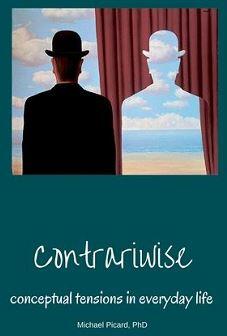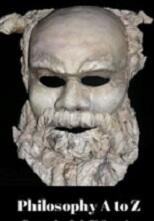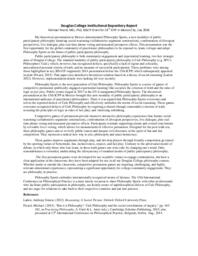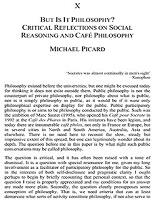Picard, Michael
Person Preferred Name
Michael Picard
Department
Related Works
Content type
Digital Document
Abstract
These jaunty essays on philosophical themes that cut through contemporary existence examine the conceptual tensions that define us and confine us. Non-technical, addressed at a general audience, the essays seek to free us from our stuck and unreflective stances, and to exorcise the semantic demons that oppress us and hold us in thoughtless thrall. Logical rigor meets love of paradox to produce therapeutic puns.
A veritable romp of philosophical fun. Poignant, personal essays exploring pairs of opposing or seemingly opposing concepts, exposing the contradictions running through everyday life, and expanding the horizons of everyday thinking. Philosophy with a pulse. -- From publisher description.
Origin Information
Content type
Digital Document
Abstract
'If there is an exception to every rule, then every rule must have at least one exception - except this one.'
Welcome to the world of the paradox - something that appears to be true and yet contradicts itself. From Galileo's Fan to the Cone of Democritus, and from the impossibility of motion to the infinite staircase, these mind-bending thought experiments, optical illusions and logical deceptions are on of the most interesting and accessible facets of philosophy. This Book Does Not Exist will stretch your mind, put your neurons through their paces, and challenge the foundations of your knowledge and opinions. You'll discover that you can't even trust your own senses - even though they may be all you have. Filled with puzzles that have intrigued the greatest philosophers, this fascinating collection of insoluble logical paradoxes will give your intellect a workout that you can't help but enjoy. Revised and expanded as (The Bedside Book of) "Paradoxes" (2013). Translated into multiple European languages, it has sold over 70,000 copies worldwide.
Origin Information
Content type
Digital Document
Abstract
Revised and expanded edition of "This Book does Not Exist" (2009). This book has been translated into 6 languages (French, Greek, Spanish, Dutch, Italian, and Estonian) and has sold 150,000 copies globally.
Welcome to the perplexing world of the paradoxical. 'Paradoxes' unveils how weird the world of thought can be. Divided into eight mind-bending chapters, it takes you on a breathtaking journey from the counter-intuitive to the downright absurd. On the way it will introduce you to topics such as impossible objects, how to expect the unexpected, and the trouble with time travel.
Packed with thought experiments, real-life examples, and exercises for you to try, 'Paradoxes' is a book that will challenge the way you perceive everything around you. It also introduces you to some of the great names in the field of paradoxes, from ancient Greek philosophers to Albert Einstein. -- From publisher description.
Origin Information
Content type
Digital Document
Abstract
A collection of essays and other texts of popular philosophy written by best-selling author, Michael Picard, MSc PhD, the MIT-trained philosopher who has facilitated hundreds of Cafe Philosophy dialogues with the public, for which the entries in this accidental lexicon were composed. Intended to stimulate readers' thoughts prior to public participatory philosophy sessions, Picard's writing invites the reader on a tour de force of the philosophical dimensions of contemporary life.
This anti-dictionary explodes the meanings of philosophically-intriguing concepts as it defines and un-defines them. Written by MIT-trained philosopher and author of best-selling This is not a Book (2007), this unique alphabetical collection of provocative essays and other texts tease and treat the reader to fresh and foreign perspectives on dozens of philosophy topics of interest to thinking public and critical seekers anywhere. At times playful or profound, alternately skeptical and reverential, the entries in this philosophical lexicon push paradox and pull for pluralism, spanning the vast range of philosophy, ancient and modern, East and West, social and spiritual, moral and metaphysical, and yet more. This book is for people yearning to explore have fun gaining new perspectives and thinking for themselves, and ready to have their minds ignited by the curious, all-consuming questioning spirit of philosophy. -- From publisher description.
Origin Information
Content type
Digital Document
Abstract
This is Not a Book will stretch your mind, put your neurons through their paces and challenge the foundations of your opinions and of knowledge itself. Filled with philosophical puzzles that have intrigued great minds of many nations for centuries, insoluble logical paradoxes and moral dilemmas, This is Not a Book provides an intellect workout that will force you to confront the consequences of your beliefs. It is divided into four sections, reflecting the major fields of philosophy: Logic, Epistemology, Ethics and Metaphysics. Each section includes a subject overview and philosopher profiles, as well as quizzes, games and thought experiments which apply the tools of philosophy to ultimate questions and everyday life.
Thought-provoking and logic-defying, This is Not a Book will test your view on reality.
Origin Information
Content type
Digital Document
Abstract
An expanded edition of "This Is Not a Book" (2007).
This book will expand your mind, put your neurons through their paces, and go as far as question the foundations of your options and knowledge itself. You'll discover that you can't even trust your own senses-even though they are all that you have. Filled with philosophical puzzles that have intrigued the greatest minds, quizzes that reveal the inconsistency of our ideas, insoluble logical paradoxes, and moral dilemmas that force us to confront our beliefs. Philosophy will give your intellect a workout that you will thoroughly enjoy.
Origin Information
Content type
Digital Document
Abstract
Report on a presentation delivered at the 15th <a href="https://www.cecapfi.com/ICPP.php">International Conference on Philosophical Practice (ICPP)</a> in Mexico City (June 25-29, 2018).
<p>My theoretical presentation in Mexico demonstrated Philosophy Sports, a new modality of public participatory philosophy featuring social reasoning (collaborative argument construction), confrontation of divergent perspectives, live dialogue, plus real-time phone voting and measured persuasive effects. This presentation was the first opportunity for the global community of practitioner philosophers to be exposed to, learn, critique and adopt Philosophy Sports as the future of public participatory philosophy.</p>
<p>Public participatory philosophy is both community engagement and experiential learning, two key strategic aims of Douglas College. The standard modality of public participatory philosophy is Cafe Philosophy, which, however, has recognized defects, specifically a lack of rigour and criticality, unscrutinized personal criteria of truth, and no measure of successful participation. Philosophy Sports is the next generation of Cafe Philosophy. Philosophy Sports is a series of games of competitive persuasion (publically-engaged experiential learning) that socialize the criterion of truth and the rules of logic as fair play. These games overcome recognized defects of Cafe Philosophy by requiring a shared (though contestable) criterion of truth, recasting the principles of logic as rules of fair play, and valorizing rethinking.</p>
Origin Information
Content type
Digital Document
Abstract
<p>Tug of Logic, a board game created in the context of the Douglas College Critical Thinking course (Philosophy 1101), was invited to the Canadian Museum for Human Rights (CMHR) to be part of the first national Canadian High School Ethics Bowl (CHSEB), which took place April 24-25, 2019 in Winnepeg. Almost 100 public high school students from across Canada (mostly Manitoba and BC) converged on the CMHR to explore the Museum, take part in a day of Ethics Games for the Mind, and to watch or compete in the CHSEB (<a href="https://www.ethicsbowl.ca/">https://www.ethicsbowl.ca</a>). The games are organized annually by the Manitoba Association for Rights and Liberties (MARL) along with numerous partners (<a href="http://www.marl.mb.ca/">http://www.marl.mb.ca</a>). Formed in 1978, MARL is a non-profit, non-governmental, human rights and civil liberties organization that works toward greater social justice through education and advocacy for human rights and civil liberties. Having adapted the US original to the Canadian context, MARL and partners have hosted an Ethics Bowl in Manitoba for a few years; 2019 marked the first national games.</p> <p>A competitive game of collaborative reasoning, Tug of Logic embodies certain principles and distinctions necessary to logical reasoning by spatializing them on the game board. Developed in the context of first-year critical thinking courses at Douglas College, it has since been adopted in Vancouver areas high schools as well. The game requires each player to write down reasons for or against a specified controversial statement and then, through facilitated dialogue, to each in turn seek support for his or her stated reason from all other players, who show where they stand by placing their game-piece in designated areas on the board. This transparency defines the persuasive problem and initiates an inquiry into unstated premises in an effort to build a logically sufficient case. Players, even junior high school students, intuitively grasp abstract distinctions between form and content, premise and conclusion, acceptability of assumptions and logical sufficiency. At these levels, the game requires initial facilitation by those with greater logical acumen, making the game suitable for teacher training.</p>
Origin Information
Content type
Digital Document
Abstract
The chapters of this book illustrate both the breadth of philosophical practice and its various methodological directions, while, at the same time, showing how philosophy can be relevant to everyday life, not just for individuals, but for the economy, the government, international organizations, the helping and therapeutic professions, and the educational system."-- Publisher.
A print copy of this book - which includes Michael Picard's chapter - is available in the Douglas College library.
Origin Information







